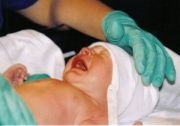Hearing tests for newborns
A hearing test screening, designed to detect hearing impairments in newborns, shell help prevent irreversible and permanent hearing problems in about 2000 babies in Germany per year. From 1 January 2009, this test might be covered by the statutory health insurances

Following an initiative launched by physicians, the statutory health insurances decided to reimburse costs for the hearing test as of 1 January 2009, said Professor Antoinette am Zehnhoff-Dinnesen last Thursday in Düsseldorf. As of that date, the test will be free of charge for the insured.
In Düsseldorf physicians specialised in pediatric audiology met for their annual congress. Zehnhoff-Dinnesen, specialist at the university hospital Münster and President of the German Society for Phoniatrics and Pedaudiology, recommends the “hearing screening” for the detection of congenital hearing impairments to be conducted within the first three months after birth. The objective of the test is to prevent permanent impediments in speech and cognitive abilities. High performance and robust hearing aids are available today for children who turn out to have a hearing problem.
“The auditory nerve develops during the first few months after birth,” explains Zehnhoff-Dinnesen. “The longer a hearing impairment goes undetected the more difficult it will be for the child to catch up in speech development.” A hearing aid will make the child’s life much easier. But it is difficult to treat small children who because they are hard of hearing have started to “save” vocabulary in the wrong place. Currently nurses are being trained to perform the test.
“We are entirely fed up”, says Professor Rainer Schönweiler of Lübeck University and spokesman of the association, “to see two-and-a-half-year-olds suffer when it could have been so easy for us to intervene in time.” According to estimates, one to three out of 1,000 babies suffer from hearing impairment. Up to a few years ago hearing problems were usually not detected before the age of two when parents started to notice that there is something wrong in their child’s behaviour.
In some German federal state hearing screening is already standard procedure, Schönweiler says, with 95 percent of the newborns being tested. The country-wide screening encompasses a central register for all newborns who are tested, but most importantly the program is designed to ensure not only diagnosis but also therapy.
Parents who fail to act despite the fact that their child was diagnosed with a hearing impairment will be contacted repeatedly. The little patients have no fear of the hearing aid, says Schönweiler: “When children need the hearing aid, the wear it. There are no significant problems.“
22.09.2008





